Atlanta Braves History: Sam Jethroe — He’s our Jackie Robinson

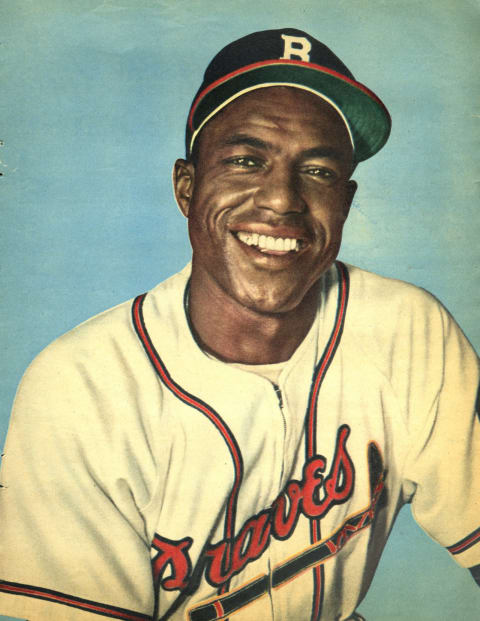
The franchise now known as the Atlanta Braves added the first African American player to their Major League roster three years after the Dodgers broke the color barrier — they should have done it sooner.
The Atlanta Braves franchise is not only the oldest continuously operating franchise in baseball, but also played a part in many of baseball’s impactful historical events. Unfortunately, they weren’t the first to add an African-American player, but Jackie Robinson played his first game against the Braves on April 15, 1947.
Two and a half years later, on October 4, 1949, the Boston Braves sent Al Epperly, Dee Phillips, Don Thompson, and considerable cash to the Dodgers for two rookie outfielders.
The deal foreshadowed the braves forced rejigging their roster the team wanted to get younger, but it also wanted to remove players who were openly unhappy with manager Billy Southworth.
The Braves had traded center fielder Johnny Hopp after the 1947 season and pieced center together in 1948. They tried that plan again in 1949 with less success.
The youngest of the new Braves outfielders, 24-year-old Bob Addis, played 101 games for Boston over two seasons. His only claim to fame, and the play that gave him a permanent place in baseball history, came on September 9, 1951, when he slid under Dodger catcher Roy Campanella’s tag.
The umpire called him safe, and the Dodgers went crazy, and that call became known as The Call Heard’ Round The World because it forced the Dodgers into a one-game playoff with the Giants, and that didn’t end well for Brooklyn.
For the Braves, Addis was bench depth. They really wanted the Dodgers 32-year old centerfield prospect, Sam Jethroe.
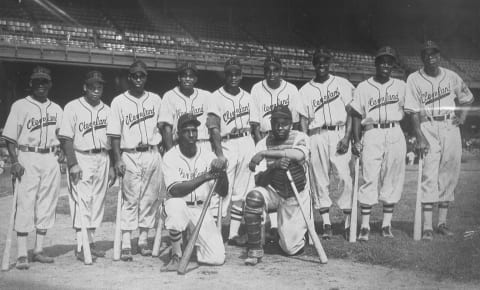
The Road to Boston
According to his SABR biography, Jethroe grew up almost next door to future Yankee outfielder and manager Hank Bauer in East St Louis, Ill. Jethroe played semipro-ball for both East St. Louis Colts and St.Louis Giants.
It was relatively common for young black men to remain in high school longer, and that was true of Jethroe, who graduated in 1940 at the age of 23.
While in high school, he played three seasons for the Indianapolis Clowns in the Negro American League.
He signed for the Cleveland Buckeyes in 1942, batted .353, won the Negro American League batting title in 1944 and followed that up by hitting .393, including 10 triples and stealing 21 bases in 1945.
On the basepaths, Jethroe ran at will. Fans had many nicknames for Jethroe. Some called him Larceny Legs, others Mercury Man, or The Colored Comet, but the one that stuck with him his whole career was Jet Propelled Jethroe or The Jet.
More from Tomahawk Take
- Atlanta Braves 2012 Prospect Review: Joey Terdoslavich
- Braves News: Braves sign Fuentes, Andruw’s HOF candidacy, more
- The Weakest Braves Homers Since 2015
- Atlanta Braves Sign Joshua Fuentes to Minor League Deal
- Braves News: New Year’s Eve comes with several questions about the 2023 Braves
His play drew the attention of those attempting to break baseball’s color barrier and earned him a tryout described as a sham in Switch-Hit Home Runs, a SABR paper.
Jethroe, along with Jackie Robinson and Marvin Williams, was (Sic) given a sham tryout in April 1945, by the Boston Red Sox. Afterwards, management summarily dismissed all three as not being up to big league standards. . . .Robinson later said of Jethroe, “He looked like a gazelle in the outfield.
Rejection angered Robinson, but Jethroe never let it get under his skin.
“The Sox were nice. I mean they didn’t take us to dinner or anything, but they were all right. It was just a workout.”
His Baseball-Reference page says he signed as a free agent, but Crossing the Line says the Buckeyes sold Jethroe’s contract for $5,000, a fact confirmed by his SABR Bio.
He joined the Dodgers in July 1948, and they sent him to Montreal, where he played in 76 games and batted .322/.385/.473/.858 and stole 18 bases. His play led to some calling him “the man who made Montreal forget about Jackie Robinson.”
He backed that up by batting .326/.403/.520/.923, hitting 17 home runs and stealing 89 bases in 1949. He might well have started in center field for Brooklyn in 1950, except they had this young outfielder named Duke Snider waiting in the wings.
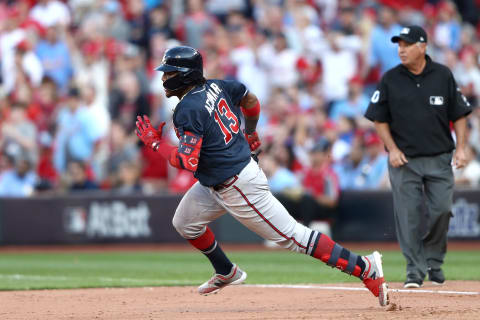
How fast was The Jet?
Many considered Jethroe the fastest man in baseball; his SABR bio suggests he was.
. . . in 1949, Jethroe was clocked in a 60-yard sprint at 5.9 seconds—two -tenths of a second faster than the world’s record at the time. . . the Dodgers (arranged) an exhibition 75-yard dash against Olympian Bunny Ewell. Jethroe beat Ewell by a few yards. In 1949. . .Arthur Daley of the New York Times noted the time Jethroe had scored from second – standing up – on an infield dribbler. The caption for the AP wirephoto that ran in the October 12, 1949 Boston Herald said Jethroe was “regarded as the greatest base runner since Ty Cobb was in his prime.”
Statcast shows Atlanta Braves’ budding superstar Ronald Acuna Jr. with a sprint spend of 29.5 feet per second. Jethroe’s 60-yard sprint speed was 30.5 feet per second, which would put him in second place for MLB last year, just ahead of Washington’s Trea Turner.
Branch Rickey had no place for Jethro and in a September 30 phone call with Boston Braves’ GM John Quinn, agreed to sell Jethroe’s contract to the Braves.
Apparently, the Braves really wanted him playing center in Boston; they paid $100,000 for his contract, that’s $1,083,911.76 in 2020 dollars.
Rickey later told Gus Steiger of the New York Daily Mirror, “It might be the biggest mistake I ever made in baseball.”
In a November 10, 1950 story about the trade, the New York Times reported that considering the value of the players traded, the Braves had paid about $137,500 for Jethroe.
However, the Boston press wasn’t impressed with Jethroe, particularly on defense. Stories agreed he was fast, but “couldn’t throw with a major league arm,” and Harold Kaese of the Boston Globe was particularly scathing.
“he cannot throw or judge a fly well enough to play center field… Jethroe looks so fast and his arm looks so weak that it’s even money he can carry the ball in from center field as fast as he can throw it in.”
His spring training performance didn’t do anything to dispell the writer’s fears. Frank Santos of the Boston Chronicle, an African-American newspaper, said Jethroe wasn’t living up to his rave reviews and had trouble adjusting. Jethroe had a lot of trouble with fly balls that Spring, but like everything else, Jethroe took it in stride.
Jethroe himself had let one ball drop during a night game, and reportedly joshed, “I lost it in the moon.”
Braves manager Billy Southworth recognized what Jethroe brought to the Braves. When they asked if Jethroe’s age concerned him Southworth quickly stomped on that idea.
I don’t care if he’s 50, just as long as he can do the job.
Santos was certain of one thing, Boston fans would enjoy watching Sam Jethroe, and he was right.
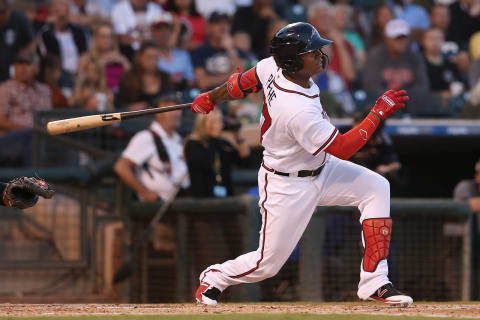
Boston ‘s answer to Jackie
Baseball fans love exciting players. Atlanta Braves fans loved seeing Ozzie Albies and Ronald Acuna Jr. running the bases, and according to his bio, Boston Braves fans loved Sam Jethroe from day one.
Sam was slightly terrific in his Boston debutante party. There were no flowers, but he slashed a couple of singles that took the strain off the Braves followers, who have not been accustomed to seeing a Braves outfielder who could hit, throw and run.
Atlanta Braves fans understand that last sentence and empathize. One young Braves fan from that time recounted how fans felt about Jethroe
“A wave of excitement rose from the stands when he stepped to the plate . . . he was our hometown answer to Jackie Robinson–a self-assured threat to steal one or more bases each time he reached first…Boos when he came to bat? Never. We just wanted to see Sammy run. . . . . . (even) The drunks (you’d see) raising their beer and toasting Sam as he was stealing second base. ‘Hey, Sam!!!
As a 33-year old rookie in 1950, Jethroe batted .273/.338/.442/.780, good for a 109 OPS+. As fans expected, he led the league in stolen bases with 35 in 44 attempts (79.5%). Jethroe also hit 18 homers, 28 doubles, 8 triples, drove in 38 runs, and scored 100.
What about those dire predictions about his defensive play? The writers were wrong. Jethroe’s 17 outfield assists placed him second in the NL behind Carl Furillo and ahead of Snider. He also led the league in double plays with six.
Baseball writers recognized his strong performance by naming him NL Rookie of the Year and placing him #27 in MVP voting.
The Braves’ recognized a PR opportunity and held a Sam Jethroe Night on September 15. When they told him about it, Jethroe asked that instead of gifts, use the money to create a college scholarship for Negro youth.
“That’s how the arrangement stands,” wrote Arthur Siegel, “and that’s why…Jethroe well rates the accolades of Boston sports enthusiasts” Boston Traveler, September 14, 1950.
He got a check, but they gave him a TV and other goodies too.
His 1952 season was better than his first. He batted .280/.356/.460/.816, posted a 125 OPS+, and once again hit 18 home runs and stole 35 in 40 attempts (87.5%). Errors continued to cause problems for Jethroe until he got his eyes checked and got glasses.
Charlie was more than Grimm
Jethroe required intestinal surgery early in 1952, returned weaker than usual and new manager Charlie Grimm didn’t hide his prejudice, openly calling his centerfielder “Sambo.”
Jethroe’s illness and the now hostile atmosphere made playing difficult, and being 35-years old didn’t help.
When the Braves moved to Milwaukee, they option Jethroe to the Toledo Sox on a 24-hour recall on April 13. Now healthy, Jethroe batted .309/.434/.560/.994, hit 28 homers, stole 27 bases, walked 106 times and had 168 hits.
The Braves had a new, 27-year old centerfielder named Bill Bruton, who they hoped be a star. Bruton was fast and stole a lot of bases, but he never produced like Jethroe.
In December of 1953, the Braves traded Jethroe to the Pirates.
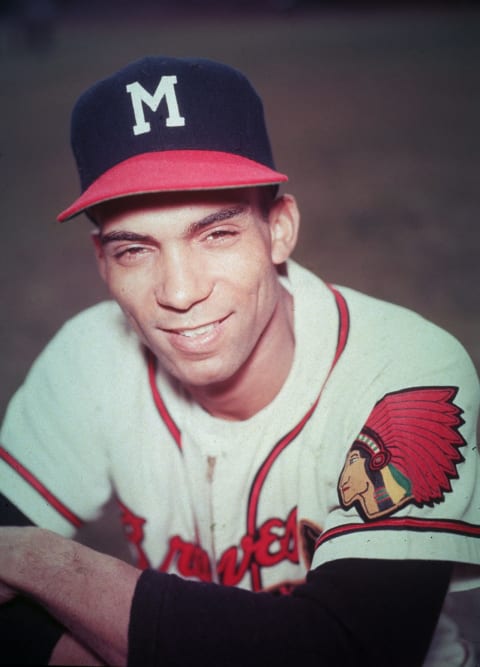
After the game is over
Jethroe had one PA for the Pirates, went on to play five more years in the minors batting .280, and a year in the Cuban Winter League before leaving the game.
I’d like to wrap this up by saying things went well for the always gentle, forgiving Sam Jethroe after he left the game, but I can’t.
He and his wife ran a successful restaurant and bar until the city of Erie forced a sale for redevelopment.
His new bar lost business after drugs and gangs moved into the neighborhood. His house burned down, they had to live over the bar, and the Jethroe family struggled to make ends meet.
Don Newcombe’s attorney heard about his situation and filed a class action suit against baseball asking that Jethroe, and other former Negro League Players, be part of the MLB pension scheme.
Poor, broke, MLB had the lawsuit dismissed on a technicality. A story recounted it in June 22, 1997, in the AJC, titled He’s our Jackie.
Fortunately for Jethroe, and the other players ignored by Bud Selig and MLB, Jerry Reinsdorf (White Sox) persuaded other owners to join him to create a fund for those players.
Retrospective
It’s sad to think about how much baseball, and the world, lost due to the ignorance and prejudice of those running the game.
It angers me when I read about it, and as I write about it. Jethroe would advise me to let it go.
When fans on the road yelled insults at him, Jethroe just smiled.
I don’t have rabbit ears; I don’t hear a thing. This is a country of free speech. Why not let the fans get their money’s worth?
When segregation kept him from staying in a hotel or eating in a restaurant, he didn’t fuss. When pitchers threw at him, he didn’t get mad; he said they had a job to do too.
He told the Cleveland Plain Dealer in 1990, “You get used to it. And you let it go.”
Jethroe’s grandson –called Sam Jethroe Jr – died after being struck by a drunk driver. Sam went to court and asked for mercy for the driver. According to the Atlanta Journal, he told the judge, “I don’t hold grudges.”
That’s a wrap
Sam Jethro was the first of a new line of speedy, switch-hitting center fielders. He wasn’t the greatest centerfielder in the league, but he was very good; Boston fans called him Our Jackie.
Jethroe did for the Braves’ franchise what Robinson did for the Dodgers, opened the door for future players of color.
He wasn’t the first African-American player in the system, but he was the first to sign a Major League contract
Imagine how well a man faster than an Olympic sprinter and a switch-hitter, batting .273/.338/.442/.780, at 34-years old, would do at 21.
Except for the switch-hitting, he sounds like Atlanta Braves prospect Cristian Pache.
Next. Game two review. dark
On June 16, 2001, at the age of 84, Sam Jethroe died. He left without fanfare, and he wouldn’t have wanted it any other way. After he passed, Boston Globe Marty Nolan eloquently summed up his career.
“The lesson in equality Jethroe taught is the civil right to be less than the best.”
Less than the best, perhaps, but Sam Jethroe was a nice man, a fine ballplayer, and an important part of Atlanta Braves’ history.